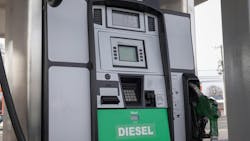Fuel cards are important tools for businesses that manage vehicle fleets, efficiently handling fuel expenses and streamlining operations. However, often the benefits of fuel cards come with various fees, which can impact their overall cost-effectiveness.
It is not uncommon for fleets that spend more than $1 million per month on fuel to pay over $10,000 in hidden fees to their legacy fuel card provider each month (more than 1% of their monthly fuel spend). Here are some of the most common types of hidden fees that legacy fuel card providers usually charge customers:
1. Inactivity fees
Inactivity fees are charged when a fuel card is not used for a certain period, typically ranging from one to three months. This fee incentivizes regular card use but can be problematic for businesses with seasonal operations or fluctuating fuel needs. Inactivity fees can add an unexpected cost for businesses not actively monitoring fuel card usage.
2. Replacement card fees
Losing or damaging a fuel card can result in a replacement card fee. While the cost of a single replacement card might seem minor, frequent replacements due to loss or damage can lead to significant cumulative expenses. Some providers may also charge an expedited shipping fee if a replacement card is needed urgently.
3. Card issuance fees
Some fuel card providers charge an issuance fee for each new card. This fee is applied when cards are first issued and can also apply when adding new cards to an existing account. The cost of issuing multiple cards can become substantial for businesses with large fleets.
4. Statement fees
While electronic statements are often free, some fuel card providers charge a fee for providing paper statements. This fee is usually nominal but can become a recurring expense if a business prefers or requires hard copies of its fuel card statements for record-keeping purposes.
5. Account setup fees
An account setup fee is sometimes charged when establishing a fuel card account. This one-time fee covers the administrative costs of setting up the account and can vary significantly between providers. While it’s a one-time charge, it’s an upfront cost that businesses must be aware of when selecting a fuel card provider.
6. Minimum usage fees
Minimum usage fees are charged when a fuel card does not meet a specified minimum spending threshold within a billing cycle. This fee ensures the provider recoups some revenue even if the card is underused. For businesses with inconsistent fuel needs, minimum usage fees can be an unexpected and unwelcome cost.
7. Out-of-network fees
Using a fuel card at stations outside the provider’s preferred network can incur non-network fees. These fees compensate for the higher costs of processing transactions at non-partner locations. Depending on the network coverage of the fuel card provider and the geographic range of the fleet’s operations, non-network fees can become a significant expense.
8. Over-limit fees
Fuel cards typically have spending limits to help manage expenses and prevent misuse. However, exceeding these limits can result in over-limit fees. These fees are charged when transactions surpass the card’s preset spending cap, adding another layer of cost for businesses not closely monitoring their fuel card usage.
9. Credit check fees
When applying for fuel cards, some issuers might charge a fee to perform a credit check, which is often overlooked.
10. Administration fees
Administrative tasks such as changing limits, adding or removing vehicles, and updating company information might come with fees.
See also: New card locking tool helps prevent fuel fraud
Strategies to mitigate hidden fees
To avoid paying hefty hidden fees to your fuel card provider, consider the following strategies:
- Read the fine print: Carefully review the terms and conditions of the fuel card agreement to identify potential hidden fees.
- Monitor usage: Regularly monitor fuel card usage to avoid inactivity, over-limit, and minimum usage fees.
- Timely payments: Ensure payments are made on time to avoid late fees.
- Opt for electronic statements: Choose electronic statements if possible to avoid statement fees.
- Choose the right provider: Select a fuel card provider with a transparent fee structure and minimal hidden charges.
- Educate drivers and managers: Educating drivers and fleet managers on the proper use of fuel cards can reduce the frequency of fees related to card misuse or loss.
About the Author

Rush Akin
Rush is an experienced veteran in the fleet industry, with over 20 years of experience in fleet management. Before joining RoadFlex, Rush served as the SVP of sales for Solera, where he was in charge of overseeing fleet sales and business development in North America. Prior to Solera, Rush worked with well-known brands in the industry, such as Rand McNally, Lytx, FourKytes, and Syntech Systems Fuel Master. Rush has a strong background in fleet and fuel management, as well as customer success.
